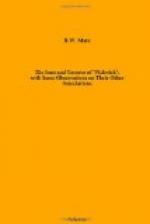Number 17 is claimed as Mr. Pickwick’s room, which is also the one Dickens occupied on one occasion, and the one spoken of in Seven Poor Travellers, from which the occupant assured us that after the cathedral bell struck eight he “could smell the delicious savour of turkey and roast beef rising to the window of my adjoining room, which looked down into the yard just where the lights of the kitchen reddened a massive fragment of the castle wall”
[illustrations: Staircase at the “Bull.” Orchestra in Ballroom at the “Bull”]
An important feature in those days, and presumably to-day, was the ballroom, “the elegant and commodious assembly rooms to the Winglebury Arms.” In The Pickwick Papers Dickens thus describes it: “It was a long room, with crimson-covered benches, and wax candles in glass chandeliers. The musicians were securely confined in an elevated den, and quadrilles were being systematically got through by two or three sets of dancers. Two card tables were made up in the adjoining card-room, and two pair of old ladies and a corresponding number of stout gentlemen were executing whist therein.”
The room itself is little altered; although the glass chandeliers have been removed, there still remains at the end the veritable elevated den where the fiddlers fiddled. During the war it was turned into a dining-room on account of the military and naval demands of the town; but there may come a time when it will revert to its old glory and tradition.
On the evening of the Pickwickians’ arrival Jingle remarks that there is a “Devil of a mess on the staircase, waiter. Forms going up—carpenters coming down—lamps, glasses, harps. What’s going forward?”
“Ball, sir,” said the waiter.
“Assembly, eh?”
“No, sir, not assembly, sir. Ball for the benefit of charity, sir.”
This was the famous ball at which the incident occurred resulting in the challenge to a duel between Dr. Slammer and Winkle, the details of which require no reiteration here.
But the pleasant fact remains that the Bull Inn exists to-day and the Dickens tradition clings to it still. One instinctively goes there as the centre of the Dickensian atmosphere with which the old city of Rochester is permeated.
The Bull Inn should never lose its fame. Indeed, as long as it lasts it never will, because Pickwick can never be forgotten. The present-day traveller will go by rail, or some day by an aerial ’bus, and may forget the old days during his journey; but when he arrives there and walks into the inn yard, whole visions of the coaching days will come back to him, and prominent amongst them will be the arrival of the “Commodore” coach with the Pickwickians on board, and the departure of the chaise with the same company with Winkle struggling with the tall mare, on their way to Dingley Dell, which resulted so disastrously. He might be curious enough to want to discover the “little roadside public-house with two elm trees, horse-trough and a sign-post in front,” where the travellers attempted to put up the horse. That, however, has not been discovered, although Dickens no doubt had a particular one in his mind at the time.




